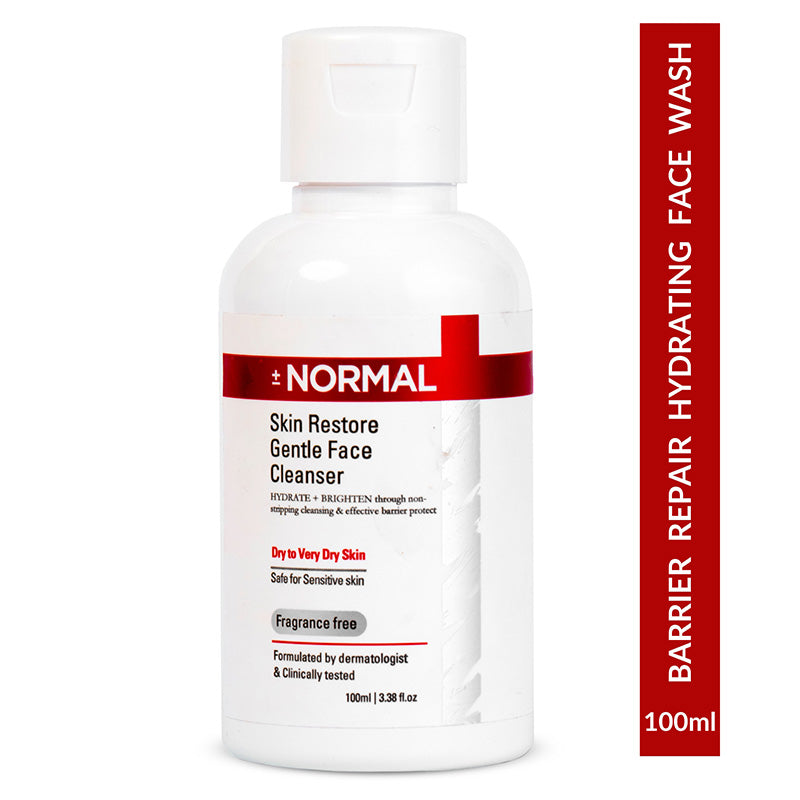Dry skin explained
Dry skin refers to a specific skin type that produces less sebum than usual leading to a lack of essential lipids needed to retain moisture and protect against external factors.
The loss of moisture in dry skin begins with the deprivation of Natural Moisturizing Factors (NMF). NMFs are substances naturally present in the skin that help it retain moisture.
When the lipid barrier is impaired, moisture escapes more easily through evaporation, leaving the skin dry. If this condition persists, moisture levels continue to decrease throughout the layers of the epidermis, resulting in very dry skin.
Symptoms of skin experiencing
DRY SKIN
- Tight
- Rough
VERY DRY SKIN
- Very tight
- Itchy
- Flaky
How do you know if you have dry skin?
To check if you have dry skin, you can perform a simple self-assessment by following these steps:
- Wash your face: Start with a gentle cleanser and wash your face using lukewarm water. Pat dry with a soft towel.
- Wait and observe: After washing, avoid applying any moisturizers or products for about 30 minutes to allow your skin to return to its natural state.
- Check for signs: Examine your skin closely in a well-lit area. Look for the following signs that indicate dry skin:
- Rough or uneven texture
- Tightness or a feeling of skin pulling
- Flaky or peeling patches
- Dull complexion or lack of radiance
- Fine lines or wrinkles
- Sensitivity or irritation
What are the causes of dry skin?
Internal factors
- Genetics - Some individuals are naturally inclined to have drier skin due to their genetic makeup.
- Hormonal - Fluctuations in hormone levels during adolescence and menopause can impact the skin's moisture balance. Women who are pregnant can experience dryness as well.
- Ageing - As we get older, the skin's metabolic rate decreases, resulting in reduced oil production and increased susceptibility to dryness.
- Diet - Insufficient intake of nutrients, including unsaturated fatty acids and vitamins can contribute to dry skin.
External factors
- Environmental factors - Dry air, excessive sun exposure ,low humidity, cold weather and exposure to harsh environmental conditions can strip the skin of its natural moisture, leading to dryness.
- Over-washing or exfoliation - Using hot water and harsh soaps can disrupt the skin's natural moisture barrier leading to dryness. Scrubbing your skin on the face or body too much can also dry your skin.
- Harsh Skincare Products - Certain skincare products, such as those containing alcohol or fragrances can strip off the skin and lead to dryness.
- Medical Conditions - Certain medical conditions, such as eczema, psoriasis, and thyroid disorders can cause dry skin. Some medications such as diuretics or retinoids may have dry skin as a side effect.
- Lifestyle - Swimming in chlorinated pool everyday, stress, less sleep may dry out the skin. Jobs where one is constantly in touch with water, cement may lead to dryness.
11 ways to Prevent and Treat dry skin
- Use a gentle and mild cleanser like the Skin Restore Gentle Face Cleanser that does not strip away natural oils from your skin.
- Moisturise, hydrate, repair, and maintain the skin barrier by using our Ceramide-Peptide Barrier Repair Cream daily.
- Apply our Body Boost Moisturising Lotion that is especially formulated for dry skin within 5 minutes of getting out of the shower to lock in moisture.
- Avoid hot water during shower as it can further dry out your skin.
- Avoid harsh soaps, alcohol-based products, and fragrances that can further irritate the skin. Our entire PLUSMINUS NORMAL skincare range promises to be free of these.
- Wash with a cleanser once a day and just rinse with water at other times.
- Hydrate the body internally by drinking plenty of water.
- Use sunscreen and stay away from physical exfoliation.
- Wear breathable fabrics such as cotton.
- For laundry, use detergents without dyes or perfumes, both of which can irritate your skin.
- Seek professional advice from a dermatologist if your dry skin persists or becomes severe.
